Ukraine, the precarious mental health of a people at war
Nearly 10 million people need help dealing with anxiety, depression, or post-traumatic stress disorder resulting from the Russian invasion
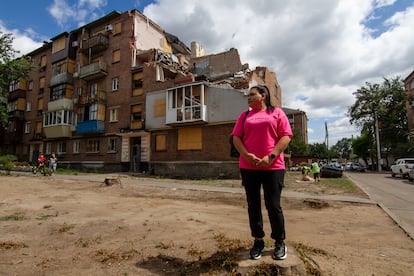
Olena Kozak’s life changed forever on the night of May 30. The 39-year-old, her husband and her mother were getting ready for bed when the silence was shattered by the roar of an explosion in their neighborhood in Kharkiv, in northeastern Ukraine. There were screams. Suddenly, everything went black. A second shell had hit their home, on the fourth floor of a five-storey building. The body of Kozak’s husband was found the next day. Her mother’s body was the last of nine people killed that rescue services recovered “under a mountain of rubble, in the middle of the street,” recalls the woman, her voice breaking. Kozak was surprisingly not wounded in the strike, but her mental health was not unscathed.
Grief over the death of loved ones, uncertainty over the loss of a home, concern for a relative in the army, fear of bombardments… These are all feelings that plague the Ukrainian population. The World Health Organization (WHO) estimates that around 9.6 million people in the country (which had a population of 42 million before the Russian invasion in 2022) suffer from mental health problems and 30% — mostly soldiers — have post-traumatic stress disorder (PTSD) due to the impact of the war.
Attacks are often directed against civilian targets, with health infrastructure bearing the brunt according to the WHO, which has verified 2,047 strikes against buildings, transport, and health personnel from 24 February 2022 to September of this year. Thousands of people have been left without access to healthcare, including mental healthcare in a country where there was already a shortage, with only one professional in this field for every 100,000 inhabitants, according to the most recent government estimates from 2017. Health Minister Viktor Liashko predicted that some 15 million Ukrainians will need psychological support and up to four million will require prescribed medical treatment as a result of the war.
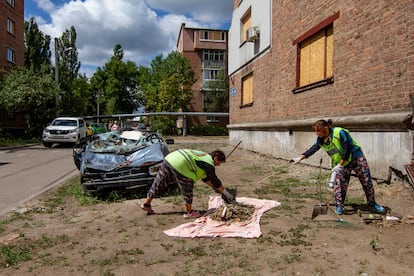
“My husband had gone into our bedroom for a moment because he wanted to get his phone. My mother went out onto the balcony to see what was happening. When I regained consciousness, half of my apartment was gone.” Memories bring tears to Kozak’s eyes as she sits on a bench in a park in what was once her neighborhood. When she was evacuated from the ruins of her home, she panicked, but from that first moment she received help. “Without a doubt, the psychologists were essential, especially when we held the funerals.” That, and the tranquilizers she was given during the first few days when she had to come to terms with the death of her mother and husband, “the two most valuable people in my life,” she laments.
War is a source of distressing events that affect the emotional state, and this has consequences, warns Jarno Habicht, WHO representative in Ukraine: “From lack of sleep and reduced productivity at work to the appearance of mental disorders or the exacerbation of pre-existing ones.” The WHO estimates that 22% of people who “have experienced war will develop depression, anxiety, post-traumatic stress disorder, bipolar disorder, or schizophrenia.”
Veronika Amrakhova is a psychologist at a center for displaced people in Kharkiv run by the United Nations High Commissioner for Refugees (UNHCR) and the NGOs Prolinska and Right to Protection, to which she belongs. Adults and children come to her clinic, and fear, depression and anxiety are the three emotions she highlights. “They ask for help because they feel under great stress,” she says.
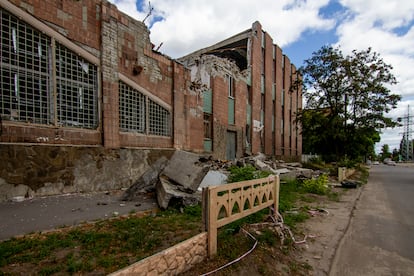
Stress is the norm for Ukrainians, as daily bombardments and air strikes have turned the lives of millions of people into a lottery. Air raid sirens sound every day from loudspeakers installed in the streets and through the app that everyone has installed on their cell phones. In Kharkiv, close to the front lines, it is common for the phone to sound the alarm up to 35 times in 24 hours.
As the war drags on, Ukrainians have become more accustomed and rarely hide in shelters anymore, otherwise they would do nothing but lie low, says Viktoriia Tiutiunnik, a UNHCR worker who was also displaced from Luhansk. “You would never be able to go to work or study, or see your family, or have fun… They can bomb us, but they will not take our lives away from us or let us be overcome by fear; for that they will have to kill us,” she says. But this desire to carry on is not incompatible with the deterioration of the mental health of those living under these circumstances.
Child care
The rain is getting heavier in Kharkiv. Thunder is rumbling outside the window, and seven-year-old Valeria is startled. She looks cautiously out into the street and hugs her doll Alyssa, the only toy she has left. Next to her in bed is her mother, Katerina Avramenko, who reassures her. “The shelling was getting very intense and the children were very scared — they even hid under the table,” she says, justifying Valeria’s fear of the storm. Avramenko, 30, her husband, and their two children lived in an apartment in Vovchansk, a town in the north of the province where fighting is taking place, until they were evacuated.
Amrakhova says that children like Valeria are living through situations of “terror.” But that’s not all. One of the side effects of war stress is the deterioration of family relationships. “I deal a lot with relationships between parents and children because war causes problems with living together… Everyone is on edge.”
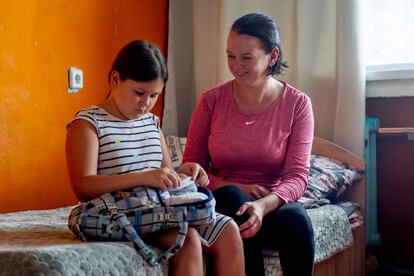
The Avramenko family now lives in a room in one of the shelters for displaced people in Kharkiv, where more than 200,000 people have already taken refuge, according to UNHCR. The spacious room has butane orange walls covered in peeling paint that Katerina has tried to hide with small stuffed animals hung with drawing pins. “When we were in Vovchansk we were more afraid, but somehow you get used to it. The children have it worse,” she admits.
Avramenko also appreciates the psychological help they are receiving. “At first I didn’t realize that the sessions were helpful, but after attending several I feel more relieved, I am in a better mood, and I can do more for my family and myself.” There are also separate activities for children and Valeria likes to go because they make “little drawings.” She likes to paint animals, especially My Little Pony.
Constant stress is not easy to treat. Amrakhova addresses it with individual and group therapy. “There are specific protocols that seek to gain control over our emotions,” she explains, although there is no magic formula. “The most important thing is to tell them not to be afraid. That it is normal to experience problems and to receive help. And that they are not alone.” Kozak, above all, values the availability of her therapist, because she is aware of how much she still depends on that support. “I know that I can call at any time if I am afraid, having nightmares, or having a bad time…” she says. That thought reassures her.
Becoming your own psychologist
The fact that Ukraine’s health system is in disrepair is well-documented. There has been a shortage of professionals in the fields of psychology and psychiatry since before the war. In the face of these shortfalls, Habicht is committed to increasing the availability of services, but also to promoting self-care. “People in Ukraine have shown a high level of resilience. Most of them can cope with stress on their own, but to help them we need to spread the necessary knowledge,” he says.
Habicht also argues that Ukraine has made “significant progress” since 2022. Among the measures implemented, the Pan-Ukrainian Mental Health Programme stands out, initiated by First Lady Olena Zelenska, which integrates mental health into different sectors, teaches self-care culture, and provides psychological help online or at home.
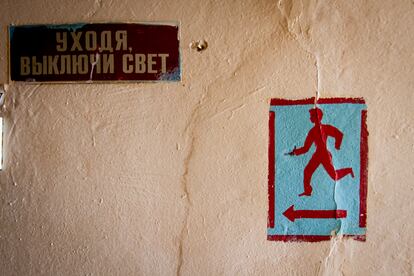
Another resource is the mhGAP program, which aims to ensure access to mental health services in primary care by training healthcare professionals. So far, 6,540 professionals have received this training and the Ministry of Health has also created a map with specialized medical centers. More than 17,000 Ukrainians have received free psychological help since 2023, according to the ministry.
Kozak has found another way to escape, at work. She is a cashier at a supermarket and decided to return to her job because it is a distraction and her co-workers comfort her. She also clings to the family she has left, her brother and her nephews, with whom she lives, and to her Orthodox Christian faith. But despite all this help, her daily life is a battle against the dark thoughts that constantly assail her. “Everything reminds me of my husband. There is even a customer at the supermarket who looks like him,” she sobs. She finds it difficult to speak, but she finds strength: “I must not be sad because if they saw me, they would be sad. I must live for them.”
Sign up for our weekly newsletter to get more English-language news coverage from EL PAÍS USA Edition
Tu suscripción se está usando en otro dispositivo
¿Quieres añadir otro usuario a tu suscripción?
Si continúas leyendo en este dispositivo, no se podrá leer en el otro.
FlechaTu suscripción se está usando en otro dispositivo y solo puedes acceder a EL PAÍS desde un dispositivo a la vez.
Si quieres compartir tu cuenta, cambia tu suscripción a la modalidad Premium, así podrás añadir otro usuario. Cada uno accederá con su propia cuenta de email, lo que os permitirá personalizar vuestra experiencia en EL PAÍS.
¿Tienes una suscripción de empresa? Accede aquí para contratar más cuentas.
En el caso de no saber quién está usando tu cuenta, te recomendamos cambiar tu contraseña aquí.
Si decides continuar compartiendo tu cuenta, este mensaje se mostrará en tu dispositivo y en el de la otra persona que está usando tu cuenta de forma indefinida, afectando a tu experiencia de lectura. Puedes consultar aquí los términos y condiciones de la suscripción digital.









































